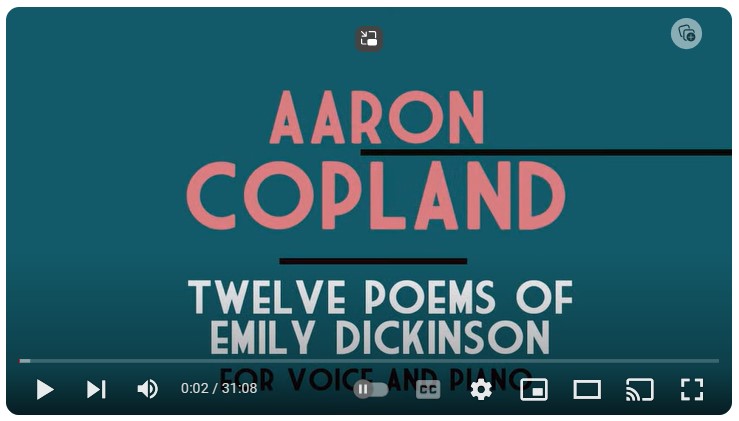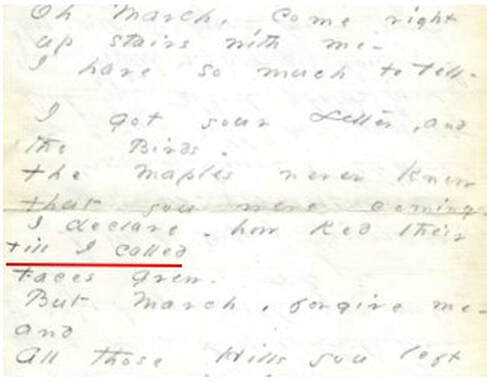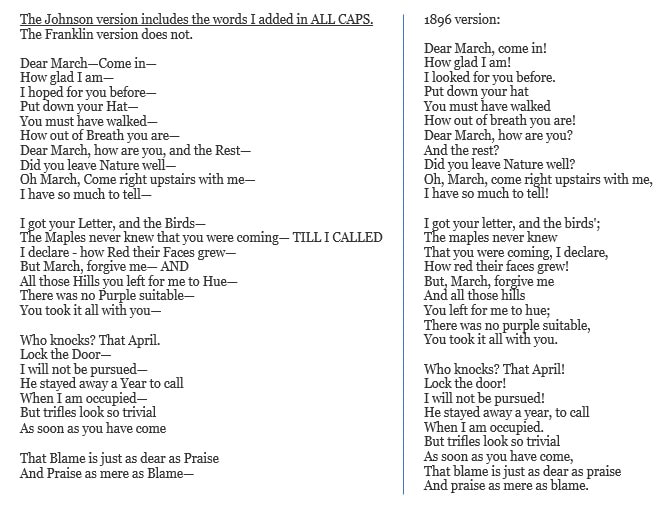1. From January 23, 2024:
| Copland’s work premiered in 1950 – so that made me wonder which versions of the poems he used, as Johnson’s seminal work, “The Complete Poems of Emily Dickinson,” was not published until 1955. I’ve compared Copland’s lyrics to various editions of Dickinson’s poetry to find out – and yesterday, I published discussion about the 4th movement of the work, “The World feels Dusty” – a poem Copland drew from a 1929 edition of selected poems by the poet. |
In the first movement, based on Dickinson’s poem “Nature – the Gentlest Mother is,” Copland’s lyrics match the Johnson edition poem – EXCEPT – in the opening line, Copland does not include the word “is” – as he used a version of the poem as published in 1891 and the publishers at that time purposefully omitted the word. Also, in line 6, the musical score reads “By Traveller – is heard” – another change made in the 1891 version; however, the woman sings “By Traveller – be heard” as is written in the version published by Johson.
In the second movement, “The Wind came like a bugle,” the poem in Johnson has line 12 as “Those looked that lived – that Day –” but Copland used, “the living looked that day.” This was another modification made by the publishers in the 1891 version of the poem. Also, line 14 in Johnson is “The flying tidings told,” but Copland used “The flying tidings whirled” – another change made by the publishers in 1891. Interestingly, in the performance I linked, the woman sings “told” even though Copland’s lyrics read “whirled.”
In “Why do they shut me out of heaven,” the third movement, Copland’s lyrics match the poem in Johnson exactly; however, Copland repeats line 8, “But don’t shut the door,” and Line 12, “Could I forbid” – and then he also ends the song by repeating the poem’s opening two lines, “Why do they shut me out of heaven? / Did I sing too loud?” This type of repetition is a common practice of lyricists in songwriting.
In “Heart, we will forget him,” the fifth movement of Copland’s work, Copland used a version of the poem from an 1896 edition of the poet’s works. Therefore, Copland uses these words as lyrics:
When you have done pray tell me
That I my thoughts may dim
Haste – lest while you’re lagging
I may remember him
This stanza from the poem actually reads as follows:
When you have done, pray tell me
That I may straight begin!
Haste! lest while you’re lagging
I remember him!
Interestingly, in the performance I linked, the lyrics appear as the lines Copland used; however, the woman actually sings the lines as they appear in the poem.
I’ll pick up with Copland’s sixth movement tomorrow.
2. From January 24, 2024:
In making the comparisons of Copland’s 12-movement song-cycle, I’ve found that he’s used poems from various editions of Dickinson’s poetry – from 1890, 1896, 1921 and more. As a result, Copland used poems from editions where publishers frequently modified the words and punctuation.
Today I have info on the 6th movement, “Dear March, come in!”
In Johnson’s version in his “Complete Poems,” the 12th line reads as follows: “The Maples never knew that you were coming — till I called”; however, Copland’s lyrics omits the “till I called” – likely because he selected the poem from an edition of Dickinson’s poems published in 1896.
Interestingly, in R. W. Franklin’s updated publication of Dickinson’s “complete poems” in 1998, he too omitted the words “till I called” – and perhaps he (and the 1896 version) got it right, and Johnson got it wrong.
I think you’ll see what I mean when you check out the pic of Dickinson’s handwriting below.
The Maples never knew that you were coming — till I called
I declare — how Red their Faces grew --
But Dickinson’s handwriting says this:
The Maples never knew that you were coming
I declare – how Red their
Till I called
Faces grew –
Sooo…Dickinson’s “Till I called” looks like a second thought/alternate possibility for “I declare” in line 13 – and NOT as an add-on segment of line 12.
That’s why I think Franklin did not include “Till I called” – he went with her original thought, “I declare” in line 13 – and I’m a bit surprised that Johnson tacked the words on where he did. Of course, there could be some other version written by Dickinson that I’m not aware of?
And then here’s another weird twist. While looking into the various versions of this poem, I stumbled upon a site (HERE) which discusses “Dear March, come in” specifically as used by Copland – and here’s what’s odd – the author included a copy of the poem “with Dickinson’s intended punctuation” – but the poem is missing lines 7 and 8. Did the blogger just make an error? Or is there a version out there without these lines?
LOL – that’s the problem with researching Dickinson – there always seems to be “another version.”



 RSS Feed
RSS Feed
